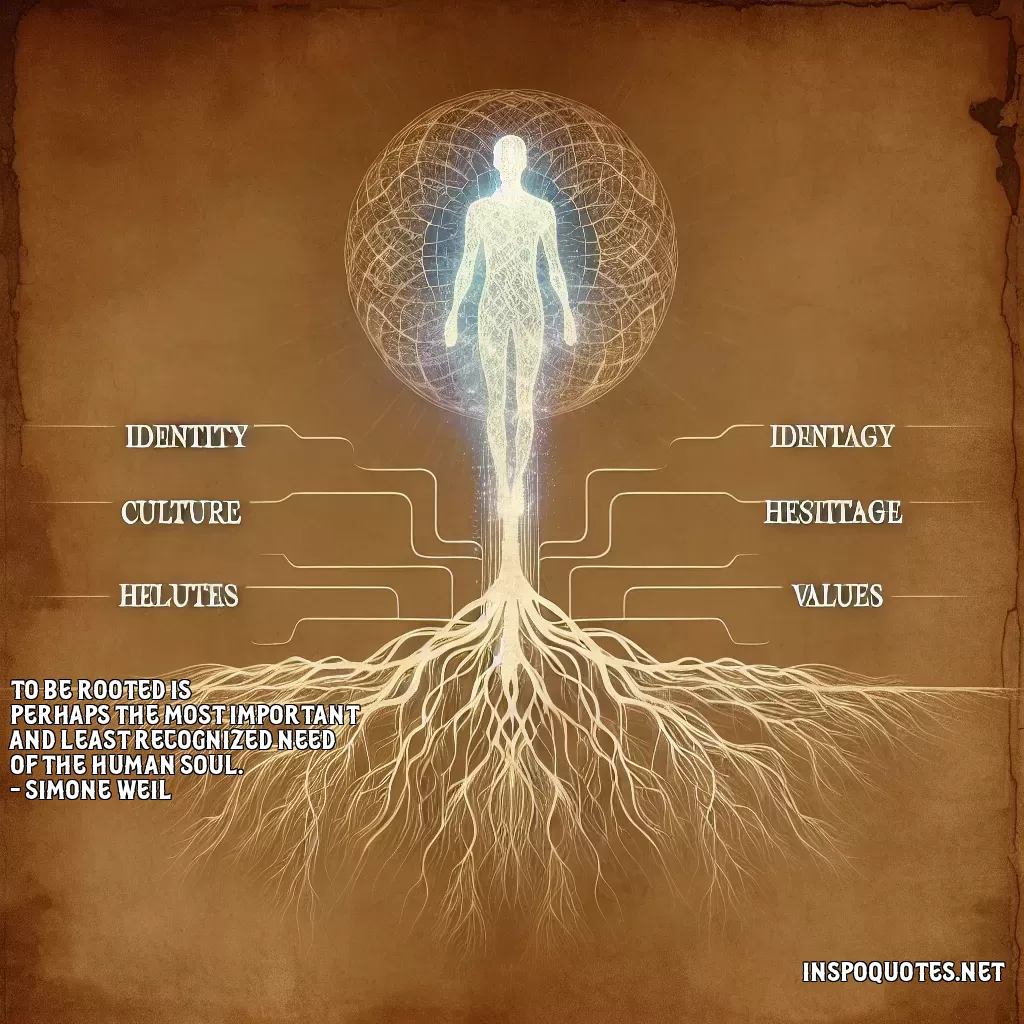
To be rooted is perhaps the most important and least recognized need of the human soul. - Simone Weil
Author: Simone Weil
👁️ 17 views

To be rooted is perhaps the most important and least recognized need of the human soul. - Simone Weil
👁️ 17 views
Simone Weil's quote, "To be rooted is perhaps the most important and least recognized need of the human soul," highlights a fundamental aspect of human existence that often goes unnoticed or underappreciated. At its core, being "rooted" refers to having a stable, secure connection to one's environment, community, and sense of identity. This can encompass having meaningful relationships, a sense of belonging, and an understanding of one's place in the world. Weil suggests that this need for rootedness is crucial to the well-being of the human soul. When individuals are rooted, they experience a sense of stability, purpose, and contentment. They have a foundation from which they can grow, explore, and develop while still feeling connected to their essence and origins. Without this sense of rootedness, people may feel adrift, isolated, or lost, struggling to find meaning or fulfillment. Despite its importance, the need to be rooted is often overlooked in modern society, where rapid change, mobility, and individualism can lead people to become disconnected from their communities and cultural heritage. In a world that frequently values progress and change over tradition and continuity, the deep-seated human need for stability and connection can be overshadowed. By bringing attention to this need, Weil invites us to reflect on the significance of our connections to others and the environments that nourish us. She encourages us to cultivate and recognize these roots as essential to our emotional and spiritual health, reminding us of our inherent desire to belong and contribute to a larger whole.
Quote By: Simone Weil
Simone Weil (1909–1943) was a French philosopher, mystic, and social activist known for her profound and often challenging ideas on ethics, politics, and spirituality. Born into a well-educated Jewish family in Paris, Weil displayed remarkable intellectual abilities from a young age. She studied at the prestigious École Normale Supérieure, where she was influenced by the works of great philosophers and leftist politics. Weil was deeply engaged with the issues of her time, particularly the societal struggles of the working class, and she worked as a teacher and laborer to better understand the lives of those she fought for.
In the late 1930s, Weil became increasingly involved in political movements, participating in the Spanish Civil War on the Republican side, which greatly impacted her views on violence and justice. Her experiences in Spain led her to a deep reflection on the nature of oppression and the moral responsibilities of individuals. Simone Weil's writings often blend philosophical inquiry with spiritual contemplation, emphasizing the need for compassion and a deep recognition of the suffering of others.
Weil's major works, such as "Gravity and Grace" and "The Need for Roots," reveal her unique perspective on the relationship between the individual and society. In "The Need for Roots," she argues for the necessity of reconnecting with one's roots as a foundation for social stability and individual identity. Throughout her writings, Simone Weil grapples with the nature of love and attention, proposing that genuine attention to others is a form of love that can lead to social transformation.
Despite her relatively short life, Simone Weil's legacy endures through her thought-provoking essays and philosophical inquiries. She was not only a thinker but also a deeply empathetic individual who sought to bridge the gap between intellectual critique and concrete action. Weil’s insistence on the spiritual dimensions of human existence and her commitment to social justice continue to resonate in contemporary discussions of philosophy, ethics, and the human condition. Her life and work exemplify a dedication to truth and justice that remains inspiring to many.